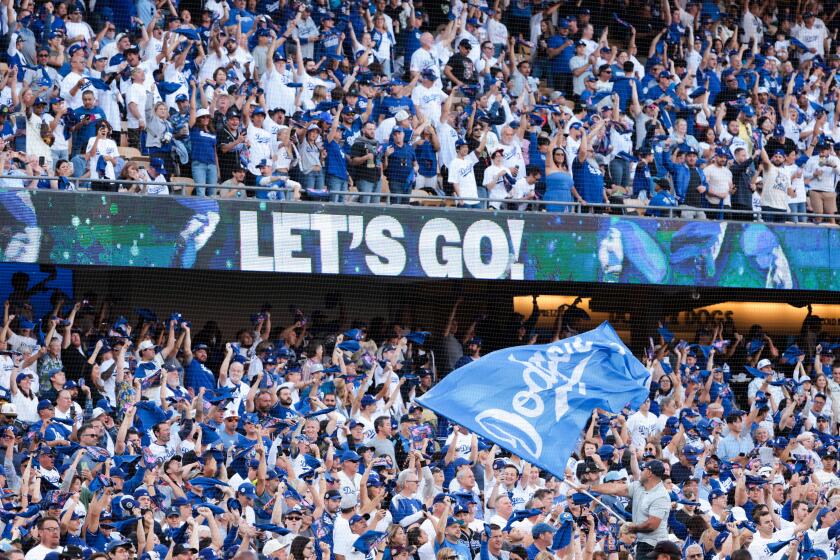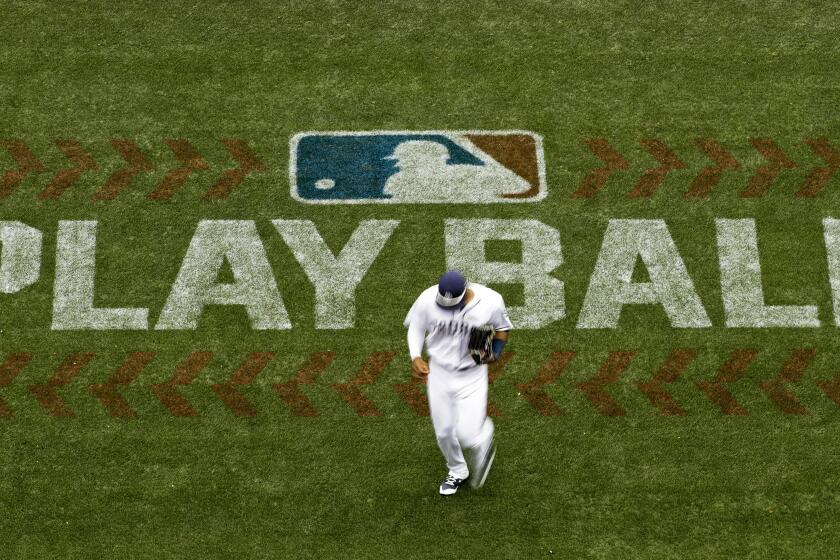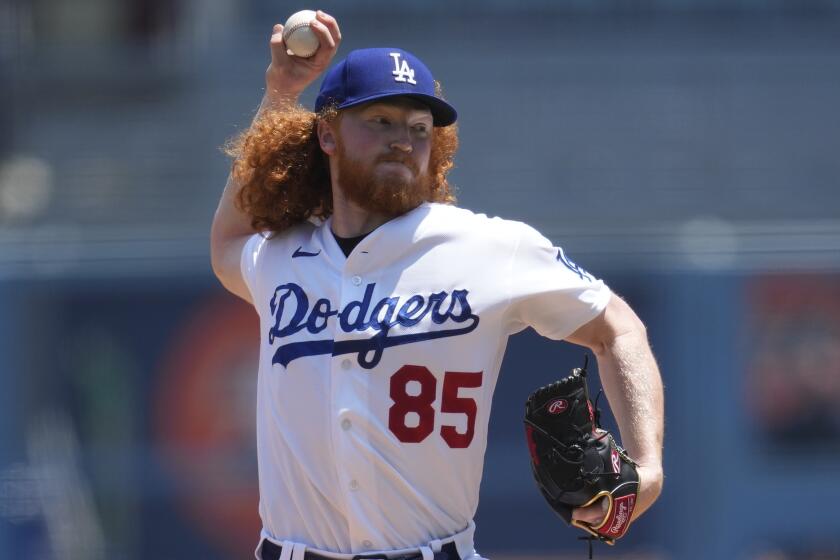
We’ll get to the chunky octopus in a bit, but we want to start with the golden ticket.
Baseball’s golden ticket, that is. Major League Baseball has a once-in-a-lifetime player in the World Series, a once-in-a-generation clash of the titans as the matchup, a blessed chance to reclaim at least some of the verity behind the phrase “national pastime.”
Shohei Ohtani steps onto baseball’s grandest stage for the first time, after becoming the first player in the league’s 148-year history to hit 50 home runs and steal 50 bases in the same season.
Ohtani! Aaron Judge! The Dodgers! The New York Yankees! In the previous century, this World Series would have sold itself.
Resale prices for the World Series between the Dodgers and New York Yankees at Dodger Stadium have soared, with prices climbing over $1,000 per ticket.
Today? Skepticism abounds, even from one of the most observant former players, Brandon McCarthy, who pitched for the Dodgers and Yankees.
McCarthy’s X post on this World Series: “Yankees/Dodgers. Ohtani&Betts/Judge& Soto. MLB better be ready to market its ass off. This has to be the national conversation.”
I ran that by the MLB marketing guy.
“I agree wholeheartedly with his tweet,” said Noah Garden, MLB deputy commissioner for business and media.
You’ll hear a lot about improved ratings during the World Series. Pay no attention. Of course more people will be watching this year. The competing teams represent the two largest cities in the United States.

In this century, as football has ruled our sporting lives, baseball has retreated to local dominance. You’ll watch the home team, day by day and all summer long, yet the casual fan pays little interest to the other 29 teams, or the stars on them.
Baseball isn’t dying. But, if MLB cannot leverage a World Series featuring its two most valuable players and its two most iconic teams, the national conversation might continue without baseball.
“Every station that I turn on in the morning, they’re talking about this,” Garden said, “whether it’s radio stations, whether it’s TV stations, whether it’s news programs.
“This has clearly broken through. This is part of the national conversation. Whether it’s the crazy ticket prices or the excitement of watching Ohtani for the first time on the national stage, there is just so much.”
When Jack Flaherty takes the mound Friday, it will be the first time in 58 years a pitcher who grew up in L.A. starts a World Series game for the Dodgers.
Garden lives in New York, so of course there is. But he insists he is hearing similar stories from “everywhere,” and he means all over the United States and in Japan, too.
From the start of the postseason, the league has featured a video spot with Ohtani and Judge with the slogan “Once in a Lifetime. Twice.” The spot appears not only on postseason broadcasts but on football broadcasts and on Netflix, TikTok and YouTube.
The league bought digital billboards in high-profile places such as Times Square in New York and the Grove in Los Angeles, with a promotion scheduled Friday at the Sphere in Las Vegas. The league also deployed 113 digital billboards in Tokyo, with 113 representing the total of Ohtani’s stolen bases (59) and home runs (54).
On social media, the league is mobilizing content creators dedicated toward younger audiences that are far more likely to look at their phone than to watch television. They’re talking baseball, but also West Coast vs. East Coast culture and music.

What Ohtani and Judge could offer is the chance for personalities to transcend the sport, in the way that casual basketball fans might have embraced Kobe and Shaq, without mastering any knowledge of the Lakers or the NBA.
Ohtani sold the most MLB jerseys this season. Judge ranked third, behind Bryce Harper. As regional sports networks implode and MLB hopes to launch national streaming packages, the league needs fans to embrace players you can identify with one name, even if they do not play for your team.
“Kids walking around with Judge and Ohtani jerseys that are not just in New York and L.A., that’s a beginning of that transition,” Garden said. “If this can help accelerate that, which I have every expectation it will based on what we are seeing, that just continues to push our sport nationally and internationally.
“That’s our strategy.”
The Dodgers already have executed an Ohtani strategy and won.
More people watched the first game of the National League championship series in Japan than in the United States, even though the game was played on a Sunday evening here and a Monday morning there, where the population is one-third that of the U.S.

When the Dodgers open their season in Japan next March, they could do so as World Series champions, with the best player in the world celebrating a homecoming.
Ohtani is not pitching this season, but he still is a two-way player: designated hitter/tourist attraction.
“It’s unbelievable,” Dodgers President Stan Kasten said. “I can’t walk to any part of my ballpark, any day, and not run into a tour group.”
The Dodgers led the league in home attendance this year, as they have every year since 2013, and this year led the league in road attendance.
Corporate sponsors wanting to get in on Ohtanimania without paying for a full season bought advertisement from opposing teams for the handful of games Ohtani might play at a visiting ballpark, rather than for the 80 regular-season games he could play at Dodger Stadium.
Shohei Ohtani vs. Aaron Judge is one of the many storylines MLB will be hyping during the World Series.
Fret not for the Dodgers. Within the first eight weeks of this season alone, the Dodgers announced sponsorships with 10 Japanese companies.
The Angels, Ohtani’s former employers, generated $10 million to $20 million per year in Japanese sponsorship revenue. In Ohtani’s first season in Los Angeles, the Dodgers generated well above $50 million in Japanese sponsorship revenue.
Ohtani agreed to play for $2 million this season, so the Dodgers could defer the remaining $68 million and allocate funds toward fortifying the roster. The signing bonus for Japanese pitcher Yoshinobu Yamamoto: $50 million.
On his own, Ohtani generated an estimated $65 million in sponsorship revenue, Sportico reported at the start of the season, with additional millions since then. The next closest MLB players on the Sportico list: Harper at $7 million, followed by Judge at $6 million.
A generation that was supposed to have dismissed baseball has found its way back to it. Baseball isn’t dying, but it could have been. Its revival required a game plan.
The Dodgers have not one but two Asian airlines as sponsors. Japan Air Lines is not one of them, but JAL has deals with Ohtani and with MLB. The company recently decorated one of its planes with images of Ohtani and called it the “Dream Sho Jet.”
The Dodgers already had a prominent history in Japan, dating back to team trips there for exhibition games and the signing of Hideo Nomo.
Said Kasten: “This has been such a good thing for MLB. They also have expanded their international sponsorship business. That is money all of us share. So this has been good all around: The combination of Shohei’s profile, the Dodgers and our history is an example of baseball putting its best foot forward.”
The Dodgers’ mission in Japan is clear: to become the team of choice for Japanese players and fans, and to make the Dodgers’ logo ubiquitous there, in much the same way that the Yankees’ logo has been a global cultural icon for decades.

And, if Japanese fans are going to flock to Dodger Stadium, you want to feed them. That brings us back to the chunky octopus.
Take a walk through the concourse on the field level, and you’ll see portable merchandise stands with T-shirts and jerseys for sale: most with the name Ohtani, some with the name Yamamoto, and hardly any with the name of anyone else, not even Betts. (The larger team stores have a broader selection.)
You’ll also see concession stands selling Asian food and drink, much more than just sushi. One of the offerings: takoyaki, sold next to a colorful poster that explains takoyaki is a “beloved Japanese street food … fritters with a variety of delicious toppings.”
What’s inside? Chunky bites of octopus.
More to Read
Are you a true-blue fan?
Get our Dodgers Dugout newsletter for insights, news and much more.
You may occasionally receive promotional content from the Los Angeles Times.











